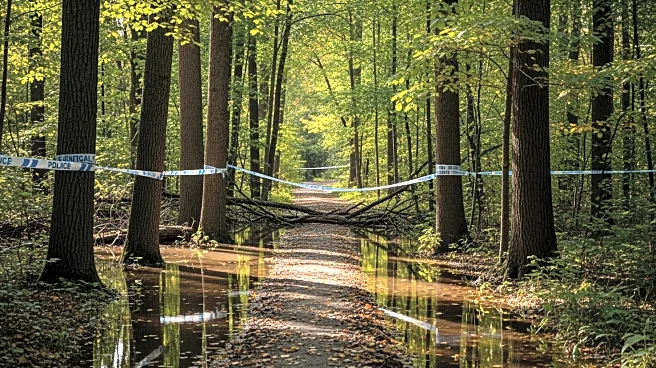What's Happening?
Michael Madigan, the former Illinois House Speaker, has commenced his 7.5-year prison sentence in a federal facility in West Virginia. Madigan was convicted on charges related to corruption during his tenure. His imprisonment marks a significant moment in Illinois politics, as Madigan was a dominant figure in the state's legislative landscape for decades. Concurrently, the current Illinois House Speaker is considering introducing legislation aimed at curbing abuses by ICE agents, which could be discussed in the upcoming veto session. This legislative move comes amid broader discussions on immigration policy reform and enforcement practices.
Why It's Important?
Madigan's imprisonment is a pivotal event in Illinois politics, symbolizing a shift away from the long-standing influence he wielded. His conviction and subsequent sentencing underscore the state's ongoing efforts to address political corruption. The potential legislation targeting ICE abuses reflects growing concerns over immigration enforcement practices, which have been contentious issues nationally. This could lead to significant changes in how immigration laws are enforced in Illinois, impacting both local communities and broader immigration policy debates. Stakeholders, including immigrant advocacy groups and law enforcement agencies, are likely to be deeply invested in the outcomes of these legislative discussions.
What's Next?
The Illinois House is expected to deliberate on the proposed legislation concerning ICE practices during the upcoming veto session. This could lead to new regulations or reforms aimed at protecting immigrant rights and ensuring fair enforcement practices. The outcome of these discussions may influence similar legislative efforts in other states, potentially shaping national immigration policy. Additionally, Madigan's absence from the political scene may lead to shifts in power dynamics within the Illinois legislature, as new leaders emerge to fill the void left by his departure.
Beyond the Headlines
Madigan's conviction and the legislative focus on ICE practices highlight broader ethical and legal challenges within the political and immigration systems. These developments may prompt increased scrutiny of political figures and enforcement agencies, encouraging transparency and accountability. Long-term, this could foster a cultural shift towards more ethical governance and fairer immigration practices, influencing public trust in political institutions and law enforcement.








